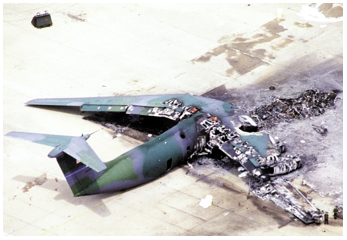John J. Lemire
James R. Callahan
Vincent J. Colvin
Wallace Spikes, Jr.
23d Maintenance Squadron
Air Combat Command
Four Air Force veterans receive overdue recognition for their heroic actions during a catastrophic aircraft accident at Pope Air Force Base’s Green Ramp. They were awarded the Airman’s Medal 19 years after the incident. They all were members of the 23rd Wing (Flying Tigers).
The Airman’s Medal is a military decoration of the United States Air Force and is awarded to those service members or those of a friendly nation who, while serving in any capacity with the United States Air Force, distinguish themselves by heroic actions, usually at the voluntary risk of life, but not involving actual combat.
Their citations read:
Senior Master Sergeant John J. Lemire distinguished himself by heroism involving voluntary risk of life at Pope Air Force Base, North Carolina, on 23 March 1994. On that date, an F-16D impacted the ground and collided into a parked C-141, which exploded into flames. The resultant fireball caused over 100 casualties and 23 fatalities in the adjacent Army training area. With complete disregard for his own safety, Sergeant Lemire despite the hazard of continuous exposure to intense heat, choking smoke, and exploding ordinance, assisted in towing a C-141B aircraft parked within 25 feet of a C-141 that was engulfed in flames following the crash of an F-16D. Within minutes of the crash, he directed actions as well as assisted in hooking up and moving power units, clearing the way for the aircraft to be moved to a safe zone. His heroic
 actions saved 52.9 million dollars in aircraft and support equipment, but more critically allowed 80 firefighters battling the blaze to do so without fear of secondary explosion from aircraft in close proximity. Upon completion of the tow, Sergeant Lemire proceeded to the troop staging area and assisted with the casualties while being exposed to burning debris and exploding munitions. Sergeant Lemire exemplifies the best qualities of all the men and women in today’s Air Force who unselfishly serve their country. The exemplary courage and heroism displayed by Sergeant Lemire reflect great credit upon himself and the United States Air Force.
actions saved 52.9 million dollars in aircraft and support equipment, but more critically allowed 80 firefighters battling the blaze to do so without fear of secondary explosion from aircraft in close proximity. Upon completion of the tow, Sergeant Lemire proceeded to the troop staging area and assisted with the casualties while being exposed to burning debris and exploding munitions. Sergeant Lemire exemplifies the best qualities of all the men and women in today’s Air Force who unselfishly serve their country. The exemplary courage and heroism displayed by Sergeant Lemire reflect great credit upon himself and the United States Air Force.
Technical Sergeant James R. Callahan distinguished himself by heroism involving voluntary risk of life at Pope Air Force Base, North Carolina, on 23 March 1994. On that date, an F-16D impacted the ground and collided into a parked C-141, which exploded into flames. The resultant fireball caused over 100 casualties and 23 fatalities in the adjacent Army training area. With complete disregard for his own safety, Sergeant Callahan despite the hazard of continuous exposure to intense heat, choking smoke, and exploding ordinance, assisted in towing a C-141B aircraft parked within 25 feet of the engulfed C-141. Fearing that the C-141 would explode as the bubbling paint on the wing’s fuel tank increased, he assisted in hooking up the tow bar to the nose gear of the aircraft. Sergeant Callahan creatively used his belt to secure steering link, enabling it to be moved to a safe zone. His heroic actions allowed 80 firefighters battling the blaze nearby to do so without fear of secondary explosion from aircraft in close proximity or more critically, becoming trapped by the explosion. The exemplary courage and heroism displayed by Sergeant Callahan reflect great credit upon himself and the United States Air Force.
Technical Sergeant Vincent J. Colvin distinguished himself by heroism involving voluntary risk of life at Pope Air Force Base, North Carolina, on 23 March 1994. On that date, an F-16D impacted the ground and collided into a parked C-141, which exploded into flames. The resultant  fireball caused over 100 casualties and 23 fatalities in the adjacent Army training area. With complete disregard for his own safety, Sergeant Colvin despite the hazard of continuous exposure to intense heat, choking smoke, and exploding ordinance, assisted in towing a C-141B aircraft parked within 25 feet of the engulfed C-141. Fearing that the C-141 would explode as the bubbling paint on the wing’s fuel tank increased, he assisted in hooking up the tow bar to the nose gear of the aircraft, enabling it to be moved to a safe zone. His heroic actions allowed 80 firefighters battling the blaze nearby to do so without fear of secondary explosion from aircraft in close proximity or more critically becoming trapped by the explosion. The exemplary courage and heroism displayed by Sergeant Colvin reflect great credit upon himself and the United States Air Force.
fireball caused over 100 casualties and 23 fatalities in the adjacent Army training area. With complete disregard for his own safety, Sergeant Colvin despite the hazard of continuous exposure to intense heat, choking smoke, and exploding ordinance, assisted in towing a C-141B aircraft parked within 25 feet of the engulfed C-141. Fearing that the C-141 would explode as the bubbling paint on the wing’s fuel tank increased, he assisted in hooking up the tow bar to the nose gear of the aircraft, enabling it to be moved to a safe zone. His heroic actions allowed 80 firefighters battling the blaze nearby to do so without fear of secondary explosion from aircraft in close proximity or more critically becoming trapped by the explosion. The exemplary courage and heroism displayed by Sergeant Colvin reflect great credit upon himself and the United States Air Force.
Technical Sergeant Wallace Spikes, Jr., distinguished himself by heroism involving voluntary risk of life at Pope Air Force Base, North Carolina, on 23 March 1994. On that date, an F-16D impacted the ground and collided into a parked C-141, which exploded into flames. With complete disregard for his own safety, Sergeant Spikes despite the hazard of continuous exposure to intense heat, choking smoke, and exploding ordinance, assisted in towing a C-141B aircraft parked within 25 feet of the engulfed C-141. Fearing that the C-141 would explode as the bubbling paint on the wing’s fuel tank increased, he assisted in moving equipment and preparing the aircraft enabling it to be moved to a safe zone. Sergeant Spikes’ heroic actions allowed 80 firefighters battling the blaze nearby to do so without fear of secondary explosion from aircraft in close proximity or more critically, becoming trapped by the explosion. The exemplary courage and heroism displayed by Sergeant Spikes reflect great credit upon himself and the United States Air Force.
Raleigh, N. Carolina (2013)
Grifton, N. Carolina
Linden, N. Carolina
Holloman, New Mexico

Comments